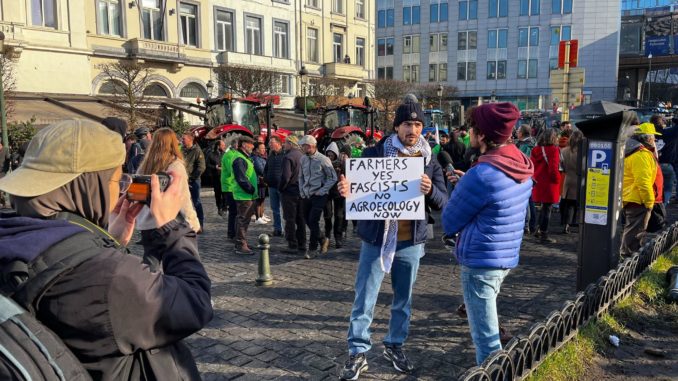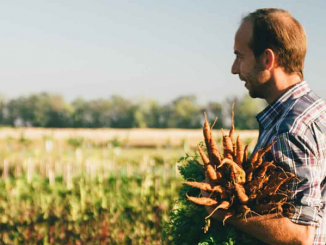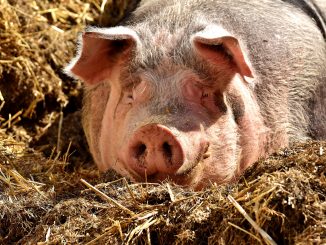
These ongoing farmer protests in Europe indicate that there is something fundamentally wrong with the European agricultural system. However, many journalists and politicians do not see the wood for the trees and link the protests to a specific policy or event. In this opinion piece, Natalia Mamonova discusses the farmer protests as indicators of the systemic crisis of the neoliberal agricultural model that has failed farmers and the planet. (Updated with video and link 14.00 CET)
Over the past couple of months, many angry farmers have taken tractors to the streets of major cities in protest. At first glance, the protests appear to have very little in common. In France and Germany, farmers are upset about the phasing out of tax breaks on agricultural diesel. In Spain they are against the government plans to curb water supply for irrigation. In Ireland, farmers marched with cows through the streets to protest restrictions on livestock farming. Polish, Hungarian, and Slovak farmers blocked the border with Ukraine for weeks to prevent the import of cheap grain from Ukraine.
This is not the first time European farmers have taken to the streets to express their discontent, but the scale of these protests is perhaps the most significant in EU history and has come as a surprise to many politicians. “I think we all sense that there is an increasing division and polarisation when it comes to topics related to agriculture,” EU Commission President Ursula von der Leyen said at the opening of the strategic dialogue for the future of agriculture in Brussels on January 25, 2024.
The response of European politicians to the farmer protests has so far been characterised by short-term concessions and small fixes that have failed to address underlying structural issues.
Video via Natasha Foote above – Farmer Protest in Brussels -1/-2/2024)
Meanwhile, all these protests – even so different in their triggers – are a manifestation of a very fundamental problem, namely: the systemic crisis of neoliberal agriculture. The last four decades have been characterised by the spread of neoliberalism in all spheres of life, including agriculture. Based on free market capitalism and laissez-faire policies, neoliberalism offered a market-based solution to socio-economic problems.
The modernisation paradigm – that prevailed in European agriculture and rural development policies – suggested that industrialisation and commercialisation of agriculture would not only increase food security, but would also constitute a powerful engine of overall economic development. This did make European agriculture more cost-efficient and technologically oriented, but it also created many other problems that farmers have to face today.
The EU’s Common Agricultural Policy aimed to “modernise” farmers by turning them into market-oriented capitalist entrepreneurs focused on constant growth and expansion. Many farmers have found themselves trapped in a vicious circle of scale enlargement, technologically driven intensification and increasing dependency on powerful agricultural corporations, banks, and supermarket chains. They have to either surrender to this dominance and continue their expansion, or go out of business.
In the last decade alone, the number of full-time farmers in the EU has fallen by one third, representing five million jobs. The decline was particularly severe in Romania (983,000 job losses), Poland (616,000), Bulgaria (387,000), as well as Germany (160,000) and France (100,000).
European farms become larger, more industrialised, and more dependent on fossil fuel and chemical inputs. According to a paper by Dutch rural sociologist Jan Douwe van der Ploeg, producing food with an energy content of 100 gigajoules (GJ) in 1950 required 81 GJ of fossil fuel. By 2015 the amount of fossil energy to produce the same amount of food had almost tripled to 225 GJ. Unsurprisingly, today industrial agriculture is one of the major environmental polluters that contribute to the climate crisis and loss of biodiversity.
Instead of rethinking the model of neoliberal agriculture, European “green projects” aim to achieve sustainable development and zero-sum emissions by following the very same logic of neoliberalism: they expand and invigorate markets through the sustainability movement, based solely on economic calculations, and placing the heaviest burden on farmers who are already suffering greatly under the current circumstances. As a result, farmers are protesting the “sustainable development” policies, and their protests are often portrayed in the media as backward, regressive and even right-wing populist.
Of course, there is no smoke without fire, and right-wing populist sentiments have come to the fore in the contemporary farmer protests. However, European farmers are no way right-wing xenophobic nationalists, they rather feel cheated by a system that first pushed them into a process of expansion, industrialisation and multiple dependencies, and now requires them to pay the price for the failure of this system.
More
Echoes of Discontent: Understanding the European Farmers’ Protests
‘Established democratic parties ignored problems of farmers for far too long’
We Can’t Eat Promises! Good Food Good Farming month culminates in Brussels protest






